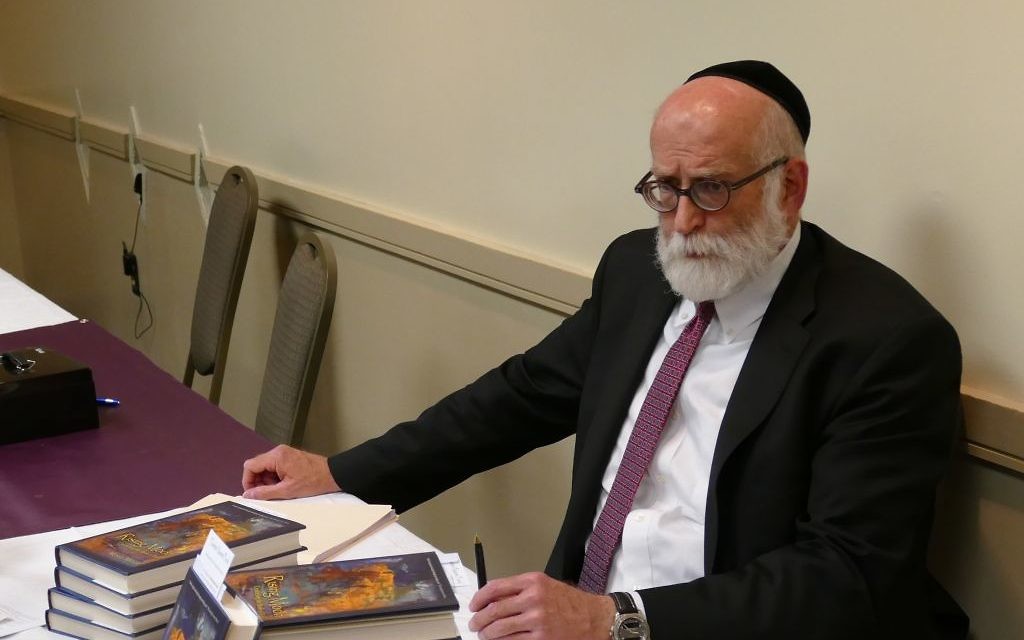Why the Messiah Springs From Usually Incestuous Roots
Three great acts of yibum lie behind the story told in Ruth, the first Jewish convert
The Book of Ruth is the key to understanding the crucial role that widows play in bringing forth the messiah, Rabbi Moshe Miller explained during an appearance at Congregation Beth Jacob on Thursday, May 11.
Rabbi Miller, a former principal of Torah Day School of Atlanta who now lives in Jerusalem, unveiled some of the lessons from “Rising Moon,” his book analyzing the Book of Ruth. It is traditional to read Ruth on the second day of Shavuot, which falls on Thursday, June 1, this year.
He focused at Beth Jacob on the mitzvah of yibum, in which the brother of a man who dies childless has the obligation to marry the widow and produce children so that his brother’s name will not die out. But in a general sense, yibum could be any male relative fathering children in a relationship that otherwise might be seen as incestuous.
Get The AJT Newsletter by email and never miss our top stories Free Sign Up
Rabbi Miller said three great acts of yibum lie behind the story told in Ruth, in which the Moabite widow of a formerly wealthy Jew follows her widowed mother-in-law back to the land of Israel. Ruth famously declares to her mother-in-law, Naomi, that she will go where Naomi goes and that Naomi’s people will be her people.
Ruth itself is a story of yibum because Boaz, a kinsman of Ruth’s dead husband, decides to marry her, and their great-grandson becomes King David, the father of the royal line destined to produce the messiah.
But the acts of yibum in Ruth’s backstory are crucial to understanding the messianic line and the highest act of kindness.
The first of the three is at the heart of creation: Cain fathering children with his sister. Without that act, there would be no mankind. Thus, commentators such as Rashi have said, G-d performs a special chesed (kindness) in allowing that yibum marriage, and the example is set that whoever does the mitzvah of yibum is acting as a partner in creation.
The second act of yibum in Ruth’s history occurs when Lot and his daughters escape Sodom before its destruction. The daughters are convinced that the world has been destroyed, so they get him drunk and sleep with him to repopulate Earth.
That coupling produces the people of Moab, where Ruth later is a princess when Elimelech, Naomi and their sons settle there during a famine back home in Bethlehem.
The third crucial act of yibum involves Tamar, the daughter-in-law of Judah. After her husband dies and two of his brothers refuse to fulfill the mitzvah of fathering a child in his name, she tricks Judah into doing the task.
That coupling leads to the family of Elimelech and Boaz, meaning that David is a direct descendant of two crucial acts of yibum even before the marriage of Ruth and Boaz.
The question, Rabbi Miller emphasized, is why yibum and widowhood should be crucial to producing the messiah.
The answer is that any act of chesed, or kindness, also has the element of the Aramaic meaning of chesed, which is shame or embarrassment. No matter how selfless the intention in an act of kindness, the beneficiary of that act is lessened in some way by the shame of accepting help.
The only exception, the only act of kindness that is entirely good, Rabbi Miller showed through use of rabbinic sources, is something done for the dead, who cannot feel shame. Yibum is the ultimate example of such an action because not only is the beneficiary (the widow’s husband) dead, but the person doing the good deed is erasing himself so that the dead man’s name will live on.
Thus, the line of the messiah is blessed by multiple examples of perfectly selfless acts of chesed.
For the Widows
Rabbi Moshe Miller spoke in support of Atlanta’s Tzarkei Naomi Fund, a Jewish fund for widows and orphans that is named for the Jewish widow who led Ruth to Boaz. In addition to the lecture at Beth Jacob, he spoke during Shabbat at Congregation Ariel, then appeared at Congregation Ner Hamizrach on Sunday before leaving town and missing the Atlanta Braves, who were on a road trip and whom he called Atlanta’s biggest attraction for him.
“I am honored to speak on behalf of an organization that is worthy of your support,” Rabbi Miller said.
Contributions to the widows and orphans fund can be made at TzarkeiNaomi.org.





comments